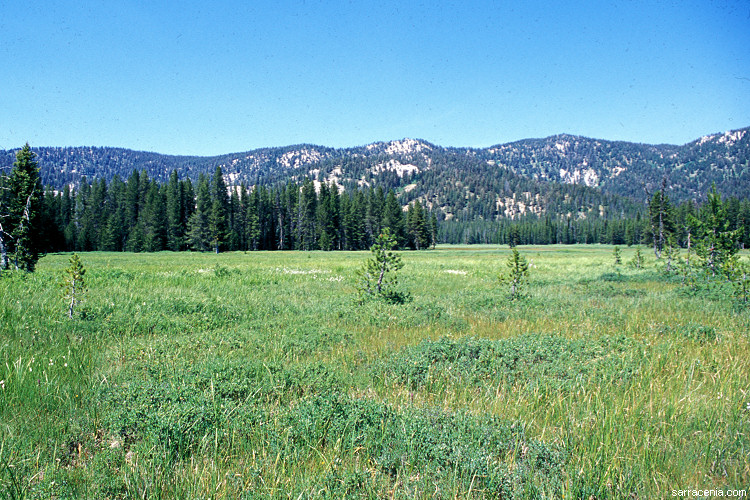
Tranquil Basin:
After much huffing and puffing, I reached a saddle in the mountain trail
and descended down into a large meadow with a deep-cut sandy stream meandering along its axis. I had read that
this large mountain valley housed Drosera anglica and Utricularia minor, so I was
excited to have made my arrival.
Upon my first view, I was filled with two conflicting sensations. The first was pleasure at seeing such a beautiful and
apparently undamaged location that contained a great diversity of microzones. The second
sensation was one of dismay--the place was quite large (nearly 4 square km) and, unlike a small lake or fen, there was no
telling where the plants might be tucked away. Were they hidden behind that cluster trees you see in this image? Were they
lurking to the left? To the right? Where should I start?
I marked my entry to the basin on my GPS--I was in its far southeastern corner--then decided to cut a transect northwest
towards what appeared to my eye and on my map to be a broad moist seep of water coursing from the mountains. How can I explain how
I set upon this path? I suppose Peter Parker would call it "spidey sense." I can only say that I have been hunting
North American carnivorous plants for many years, so have a lot of experience knowing what to look for.
Even though I was confident I would find my target plants quickly, I stashed my field press, extra camera
equipment, and other non-essential gear under some trees--which I flagged so I could refind them easily--then
started looking for plants.
I travelled slowly, keeping my eyes on the ground, but occasionally glanced up and around to mark my progress.
Travel ranged from speedy over grassy terrain to glacial when I had to force my way through heavy
growth of woody shrubs.
I saw some purplish-red swaths of plants in an open field--it looked like distant Drosera anglica in exactly the
direction where I was heading--and with a
smug grin pressed on. My years of experience were paying off!